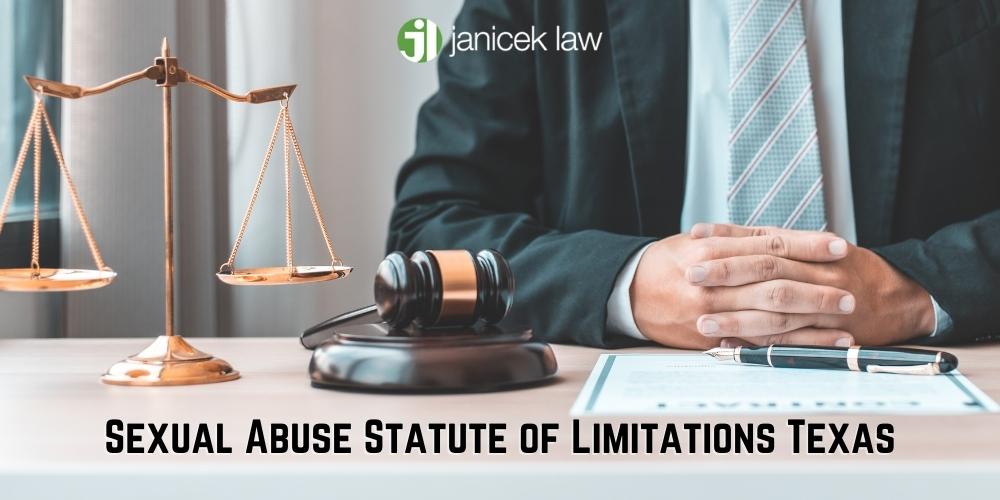Tragically, childhood sexual abuse is a daily occurrence in the United States. Until a few years ago, there was a strict time limit on when these child victims could come forward as adults and file a lawsuit in civil court for damages. Childhood sexual abuse causes incredible physical and psychological damage. Many victims don’t remember their abuse until well into adulthood. Similarly, many victims do not realize what actually happened to them until they are adults. Before 2019, the civil and criminal statutes of limitations on certain sex crimes in Texas prevented these victims from pursuing justice by the time they were ready to speak up about their abuse. It’s because of this very reason that many states (including Texas) have expanded their sexual abuse statute of limitations. Below, our legal team discusses the Texas’ sexual abuse statute of limitations for both civil and criminal procedures.
If you have endured child sex abuse at the hands of a clergy member, a therapist, a doctor, a teacher, or a Boy Scouts leader, you may still have time to file a civil lawsuit in the state of Texas. San Antonio sexual abuse lawyers at Janicek Law have what it takes to take on your civil suit, defend your rights, and make sure you receive a fair settlement. Call 210-366-4949 to schedule a free consultation today.
How Many Children Are Sexually Abused in the U.S. Every Year?
Child sex abuse is a widespread problem in the United States. According to the Rape, Abuse & Incest National Network (RAINN), more than 57,000 children were sexually abused in fiscal year 2016 alone. Additionally, 1 in 9 girls and 1 in 53 boys under the age of 18 are sexually abused by adults.
What is the Statute of Limitations?
The statute of limitations is a law that puts a time limit on how long someone has to file a lawsuit in order to recover financial compensation for a wrongful act. Statutes of limitations exist in both criminal law and civil law. Each state has a different statute of limitations for different types of crimes and/or wrongful acts. If a plaintiff attempts to file a lawsuit after the statute of limitations has expired in their state, then their case will likely be dismissed.
But why do statute of limitations exist in the first place? The main goal of these state laws is to protect defendants in lawsuits. There are three main reasons why statutes of limitations came to be:
- If a plaintiff has a valid cause of action, they should seek justice within a reasonable time frame.
- By the time a civil or criminal case is litigated, the defendant may not have solid evidence to disprove the wrongful act because of how many years have passed.
- Bringing an alleged offense to the judicial system long after it had occurred may bring more cruelty than justice to everyone involved.
Texas Statute of Limitations for Sexual Misconduct
In 2019, the statute of limitations law changed in Texas (and several other states) so that victims of child sex abuse have more time to sue their alleged perpetrator for the physical and mental harm they may have caused.
There are several reasons why multiple state laws changed regarding sex crime cases. Firstly, child abuse of any kind is incredibly confusing for children. Children are naturally very naive. So when there’s lots of grooming and psychological manipulation involved, many children think that the sexual penetration, sexual exploitation, sexual molestation, and other sex crimes they are enduring is okay. Some child victims completely block out the sex acts from their memory due to the level of psychological trauma.
Children cannot file lawsuits against anyone, even if they want to. So by the time the child grows up and has the chance to file a lawsuit against their abuser, the statute of limitations may have already expired. Additionally, many child victims do not remember or realize what happened to them until they are adults. So it’s the same situation – their specific state law prevents them from seeking justice for their alleged sexual abuse. As a result, the victim will never receive closure and justice, and alleged defendant may remain on the run, committing sexual assault upon other children.
Secondly, the sex crime scandal surrounding Catholic priests had peaked in the mid to late 2010’s, although these felony sexual abuse cases had been occurring for decades. The Me Too Movement – a huge social movement against sexual abuse and rape culture – was also really big around this time. Most of the victims of these clergy sex crimes were children at the time. Expanding the statute of limitations in many different states allowed these (now adult) victims to sue the priest or church that perpetuated the abuse.

Child Sexual Abuse Cases
Before 2019, Texas statute of limitations only provided victims of child sex abuse 15 years from their 18th birthday to file a civil lawsuit against their alleged perpetrator. Now, Texas law (HB 3809) allows victims 30 years from their 18th birthday to file a civil lawsuit. In other words, the sexual abuse statute of limitations in Texas expires when a victim is 48 years old.
Not only can victims of child molestation and forcible rape sue their abuser, but they can also sue institutions and entities that may have perpetuated the abuse (such as churches, schools, clinics, community organizations, etc.) For example, many child sex abuse cases that occurred within the Catholic church claim that the church actively covered up the abuse or failed to remove the clergy member from their role. As a result, the same victim may have continued to be abused, or the clergy member went on to abuse other children. In these situations, the church perpetuated child sex abuse.
If you have been a victim of child sexual abuse in the state of Texas, you have grounds to pursue a civil lawsuit as long as you’re still under the age of 48. The legal team at Janicek Law has the skill and experience necessary to successfully litigate child sex abuse cases. We want to help victims find the courage to speak up and receive the justice they have always deserved for their suffering.
Criminal Sexual Assault Cases
A criminal procedure serves to charge and imprison the perpetrator for the alleged offense while a civil procedure serves to compensate the victim. Sexual abusers can face both a civil and a criminal procedure at the same time.
Criminal statutes of limitations in Texas are different. Depending on which type of crime occurred, the criminal statute of limitations is 20 years from the victim’s 18th birthday or no statute of limitations. Before we break down the certain crimes that have statute of limitations and which ones don’t, it’s important to keep in mind that the age of consent in Texas is 17 years old. So criminal sexual conduct with a child occurs when the victim is under 17 years old.
The types of sex crimes listed below do not have criminal statute of limitations in Texas:
- Sexual assault of a child
- Continuous sexual abuse of a child
- Indecency with a child
- Aggravated sexual assault of a child
The types of sex crimes listed below have a criminal statute of limitations of 20 years from the victim’s 18th birthday:
- Aggravated kidnapping with the intent to commit a sex crime
- Sexual performance by a child
- Burglary of a home with the intent to commit a sex crime
There is a DNA exception to the statute of limitations for felony sex crimes in Texas. According to Texas Law, there is no limitation for sexual assault if DNA evidence is found during the investigation and testing shows that it doesn’t match the victim or any other previously identified person.
Damages for a Civil Sexual Abuse Lawsuit
San Antonio sexual abuse lawyers at Janicek Law can help victims recover financial compensation for the following types of damages:
- Past and future medical expenses if you suffer from physical health issues related to your sexual trauma.
- Medical expenses associated with a psych ward hospitalization.
- Physical pain and suffering.
- Emotional distress and mental health disorders.
- Mental health counseling expenses.
- Lost wages if your sexual trauma has caused you to miss work.
- Loss of earning capacity if your sexual trauma/mental disorders prevent you from accomplishing all your job duties.
- Loss of consortium if your sexual trauma prevents you from having a normal, healthy relationship with your partner/spouse.

Call a San Antonio Sexual Abuse Lawyer at Janicek Law Today
If you have been sexually assaulted by a clergy member, a school employee, a Boy Scouts leader, a therapist, a doctor, or anyone else, you may have grounds to file a civil suit in the state of Texas. At Janicek Law, we fully understand that the physical and mental effects of childhood sexual abuse stick around for a lifetime. That’s why we are so passionate about helping our clients pursue justice and financial compensation for these sex crimes. Allow us to take on your case, defend your legal rights throughout the entire legal process, and make sure that your voice is finally heard. Call 210-366-4949 to schedule a free consultation with our legal team today.

